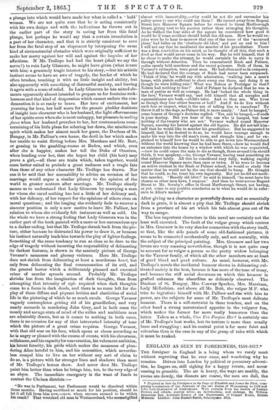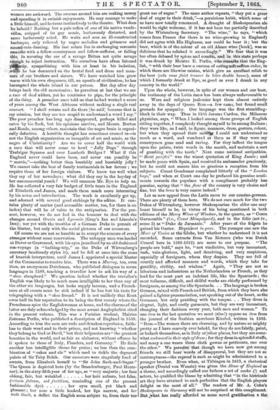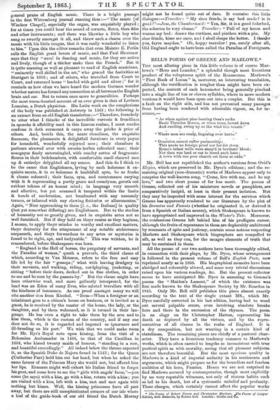ENGLAND AS SEEN BY FOREIGNERS, 1558-1617.*
THE foreigner in England is a being whom we rarely meet without regretting that he ever came, and wondering why he remains. Driven into London by political or pecuniary adversi- ties, he lingers on, still sighing for a happy return, and never ceasing to grumble. The air is heavy, the ways are muddy, the rooms are dowdy, the dinners are coarse, the men are dull, the • England as Seen by Foreigners in the Days of Elisabeth and James the First, com- prising translations of the Journals of the two Dukes of Wirtemberg in 1592 and 1610, both illustrative of Shakespeare. With extracts from the travels of foreign Princes and others, copious notes, an introduction, and etchings. By William Brenchley Rye, Assistant-Keeper of the Department of Printed Books, British
Museum. London: John Russell Smith, Soho square. 1805.
women are awkward. The swarms around him are making money and. spending it in swinish enjoyments. He may manage to make a Bttle himself, and he turns instinctively to the theatre. What does he behold? Nothing but a pale reflex of one of his native vaude- villes, stripped of its gay music, barbarously distorted, and more barbarously acted. He waits and sees an ill-constructed burlesque, only relieved by negro melodies and grimaces and seconci-rate dancing. His last solace lies in exchanging sarcastic remarks with a fellow-countrymen and fellow-sufferer, or failing this, in securing the ear of a savage Briton not quite savage enough to reject instruction. We ourselves have often listened
sympatbiling with him at least in his isolation, se he has descanted on the brutal food and dress and man- ners of our brothers and sisters. We have watched him grow warm with his own eloquence, till, an apostle of civilization, he has harangued the whole island in our person. But day after day brings back the old monotonies ; he perceives at last that we are a race of deaf adders, yet he continues to pipe, for the principle of the thing. A preacher once told us that he had worked a score of years among the West Africans without making a single real convert. "r shall return and die there [he said] bemuse that is my mission, but they are too stupid to understand a word I say."
The poor preacher has long ago disappeared, perhaps killed and eaten by his flock, but his opinions survive, and Messrs. Burton and Reade, among others, maintain that the negro brain is organi- cally defective. A horrible thought has sometimes crossed us—is not the English organization as incapable of art and music, as the negro of Christianity ? Are we to cover half the world with a race that will never cease to howl "Jolly Dogs" through Trafalgar Squares and over Lambeth Bridges ? What if this England never could have been, and never can possibly be " merrie,"—nothing better than beerishly and boorishly jolly ? We cannot take the best of family testimonials in her favour ; we require those of her foreign visitors. We know too well what they say of her nowadays ; what did they say in the heyday of her uncommercial youth ? We will summon Mr. Rye to help us. He has collected a very fair budget of little tours in the England of Elizabeth and James, and made them much more interesting by his notes and introduction. The work is excellently got up, and adorned with several good etchings by the editor. It con- tains plenty of matter (and accessible matter, too, for there is an index) that will be of value to the antiquarian. For the pre- sent, however, we do not feel in the humour to deal with the changes around Grezin and Lyconsin (Gray's Inn and Lincoln's Inn) ; nor yet with the troubles of a German Duke in pursuit of the Garter, but only with the social pictures of our ancestors.
Of course we are not so humble as to accept the censure of every stranger without some reservation. The unhappy man was landed at Dover or Gravesend, with his eyes jaundiced by an old-fashioned sea-voyage (a "bathing-trip," as the Duke of Wirtemberg's secretary facetiously styles it), and he fell at once into the arms of knavish interpreters, until James I. appointed a special Master of the Ceremonies to receive him. There was a Murray, too, even then, an anonymous Dutchman, who published dialogues in seven languages in 1589, teaching a traveller how to ask his way of a "thee sheapherd." We question indeed whether the traveller's English was likely to be much more intelligible to her than any of the other six languages, but looks supply lacunas and a French- man at all events must be sick indeed if he has lost his taste for telegraphing with a " shee freend." It is not unlikely that Kent owes half its fair reputation to its being the first county where the Frenchman spies the Englishwoman at home, and the charms of the latter are duly acknowledged by the most arrant Anglophobist cited in the present volume. This was a Parisian student, Maistre Estienne Perlin, who published a description of England in 1558. According to him the men are rude and drunken reprobates, faith- less to their word and to their prince, and not knowing "whether they belong to God or Devil," but their helpmates are the greatest beauties in the world, and as fair as alabaster, without offence be it spoken to those of Italy, Flanders, and Germany." He finds another less intelligible theme for praise ; no less than the com- bination of "cakes and ale" which used to tickle the depraved palate of Sir Toby Belch. Our ancestors were singularly fond of sweets, from Elizabeth herself to "Sir John Sack-and-Sugar." The Queen is depicted here (by the Brandenburger, Paul Heats- in the sixty-fifth year of her age, as "very majestic ; her face oblong, fair, but wrinkled her hair auburn, but false, (crinem fulvum, sed factitium, reminding one of the present fashionable dye) her eyes small, yet black and pleasant ; her nose a little hooked, her lips narrow, and her teeth black, a defbct the English seem subject to, from their too
great use of sugar." The same author repeats, "they put a great deal of sugar in their drink,"—a pernicious habit, which some of us have now totally renounced. A draught of Shakespearian ale would be right welcome, if it has not been too partially described by the Wirtemberg Secretary. "The wine," he says, "which comes from France (for there is no wine-growing in England) did not agree with His Highness, nor could he bear it ; but the beer, which is of the colour of an old Alsace wine [hock], was BO delicious that he relished it exceedingly." We fear that it was too often debased by spices and comfits, and in this state perhaps it was drunk by Maiatre E. Perlin, who remarks that the Eng- lish, "with their beer have a custom of eating soft saffron cakes, in which there are likewise raisins, which give an excellent relish to the beer (cela vous faict trouver la bare double bonne), some of which I formerly drank at Rye, as good as ever I drank in any country in the world."
Upon the whole, however, in spite of our women and our beer, the testimony of the Latin races has been always unfavourable ta us. Wars and religious jealousies kept them almost entirely away in the days of Queen Bess —a few came, but found small grounds for sympathy. Our language was the first stumbling- block in their way. Thus in 1585 Jerome Cardon, the Milanese physician, says, "When I looked among those groups of English sitting together, I completely thought myself to be among Italians ; they were like, as I said, in figure, manners, dress, gesture, colour, but when they opened their moat* I could not understand so much as a word, and wondered at them as if they were my countrymen gone mad and raving. For they inflect the tongue upon the palate, twist words in the mouth, and maintain a sort of gnashing with the teeth." Next came national antipathies. " Beati pacifici" was the wisest quotation of King Jamie ; and he made peace with Spain, and received its ambassador graciously, but he could not ensure him so gracious a reception from his subjects. Count Gondomar complained bitterly of the "London buys," and when at Court one day he prefaced his genuine senti- ments towards the populace with a compliment probably less genuine, saying that "the flour of the country is very choice and fine, but the bran is very coarse indeed."
Let us now appeal from the Latin races to our cousins-german. There are plenty of them here. We do not care much for the two Dukes of Wirtemberg, however Shakespearian the elder one may boast himself to be, in virtue of his being mentioned in both editions of the Merry Wives of Windsor, in the quarto, as " Cosen Garmomble " (i.e., Count Mompelgard), and in the folio (act iv-., scene 5) as "Duke de Jarmanie." After years of the fidgets he gained his Garter. Requiescat in pace. The younger one saw the Moor of Venice at the Globe, but whether he understood it is not recorded. Some extracts from Van Meteren (who was Dutch Consul here in 1583-1612) are more to our purpose. "The people are bold," says he, "not vindictive, but very inconstant, rash, vain-glorious, light, and deceiving, and very suspicious, especially of foreigners, whom they despise. They are full of courtly and affected manners and words, which they take for gentility, civility, and wisdom." Again, "They are not so laborious and industrious as the Netherlanders or French, as they lead for the most part an indolent life, like the Spaniards ; the most toilsome, difficult, and skilful works are chiefly performed by foreigners, as among the idle Spaniards. . . The language is broken German, mixed with French and British, from which they have also gained a lighter pronunciation, not speaking out of the heart, as the Germans, but only prattling with the tongue. . . They dress in elegant, light, and costly garments, but they are very inconstant, changing their fashions every year, both men and women." To one item in the last quotation we must (alas!) oppose an item from the journal of the Suabian merchant Kieehel, written in 1585. "Item—The women there are charming, and by nature so mighty pretty as I have scarcely ever beheld, for they do not falsify, paint, or bedaub themselves, as in Italy or:other places, but they are some- what awkward in their style of dress; for they dress in splendid stuffs, and many a one wears three cloth gowns or petticoats, one over the other." We perceive that though we have now got among friends we still hear words of disapproval, but they are not so contemptuous—the reproof is such as might be administered to a younger brother. Even when, at Tubingen in 1613, a rhetorical speaker (Daniel von Wensin) was given the Abuse of England as a theme, and accordingly called our fathers a set of cooks (!) and actors, he qualified the blame by admitting that "in the histrionic art they have attained to such perfection that the English players delight us the most of all." The readers of Mr. A. Cohn's Shakespeare in Germany will not be surprised at this compliment. But ;what has really afforded us some novel gratificatiou a the general praise of English. music. There is a bright passage in the first Wirtemberg journal running thus :—" The music [of Windsor Chapel], especially the organ, was exquisitely played ; for at times you could hear the sound of cornets, flutes, then fifes and other instruments ; and there was likewise a little boy who sang so sweetly amongst it all, and threw such a charm over the music with his little tongue, that it was really wonderful to listen to him." Upon this the editor remarks that even Maistre E. Perlin calls the English great lovers of music, and that Paul Hentzner says that they "excel in dancing and music, for they are active and lively, though of a thicker make than the French." But it is quite amusing as well as pleasant to read of English maddens, "eminently well skilled in the art," who graced the festivities at Stuttgart in 1603; and of others, who travelled from Court to Court, and returned home "leaded with gold and silver ;" for it reminds us how often we have heard the modern German wonder whether nature has formed any connection at all betweenthe English brain and ear. But to return once more to generalities. Perhaps the most warm-hearted account of us ever given is that of Levinus Lemnius, a Dutch physician. His Latin work on the complexions of the body was published at Antwerp in 1561; the following is an extract from an old English translation:—"Therefore, franckely to utter what I thincke of the incredible curtesie & frendlines in speache & affability used in this famous realme, I must needes confuse it doth surmount & carye away the pricke & price of others. And, beside this, the neate cleanlines, the exquisite fineness°, the pleasaunte & delightfull furniture in every poynt for household, wonderfully rejoysed mee ; their chambers & parlours strewed over with sweet& herbes refreshed mee ; their nosegayes finely entermingled, with sundry sortea of fragraunte floures in their bedchambers, with comfortable smell cheered mee up & entirelye delyghted all my sences. And this do I think to be the cause that Englishmen, Vying by such holesome & ex- quisite meate, & in so holesome & healthfull ayre, be so freshe
& cleane coloured ; their faces, eyes, and countenance carying with it & representing a portly grace and comelynes, geveth out evident tokens of an honest mind ; in language very smooth and allective, but yet seasoned & tempered within the limits
& bonds of moderation, not bumbasted with any unseemly t,ermes, or infarced with any clawing flatteries or allurementes." Again, "Near approaching to them [i. e., the Italians] in quality (but yet somewhat differing) are Englishmen. But to the studies of humanity not so greatly given, and in exquisite artes not so well furnished. But if they hold on theyr course as they beginne, I meane, to apply theyr mindes to worthy and excellent matters, theyr dexterity for the attaynment of any notable atchievance surpas.seth, and theyr forwardnes to any artes or mysteries is found to be right, apt, and inclynable." This was written, be it remembered, before Shakespeare was born.
"England is the Hell of horses, the purgatory of servants, and the Paradise of women," quoth a proverb, the third clause of which, according to Van Meteren, refers to the free and easy life led by the fair " gosseps ;" what with leaving drudgery to their servants, and walking, riding, cardplaying, junketing, or sitting "before their doors, decked out in fine clothes, in order to see and be seen by the passers-by." But the clause might have been otherwise read, and more gallantly interpreted, for the land was an Eden of many Eves, who saluted travellers with all the kindness of innocence. As one proof amongst many we will cite another item from Siechel. "Item—When a foreigner or an inhabitant goes to a citizen's house on business, or is invited as a guest, he is received by the master of the house, the lady, or the daughter, and by them welcomed, as it is termed in their lan- guage. He has even a right to take them by the arm and to kiss them, which is the custom of the country-, and if any one does not do so, it is regarded and imputed as ignorance and ill-breeding on his part." We wish that we could make room for Mr. Rye's Royal note upon kissing, from the visit of a Bohemian Ambassador in 1466, to that of the Castilian in 1604, who kissed twenty maids of honour, "standing in a row, and beautiful exceedingly." All indeed below the throne expected it, as the Spanish Duke de Najera found in 1548; for the Queen (Catherine Parr) held him out her hand, but when he asked the same favour of the Princess Mary she would not, but offered him her lips. Erasmus might well exhort. his Italian friend to forget his gout, and come here to see the "girls with angels' faces,"—you come (he says) with a kiss, go with a kiss, return with a kiss ; you are visited with a kiss, left with a kiss, met and met again with nothing but kisses. Well, the kissing princesses have all past away, but there are still unsophisticated corners of our isle where a leaf of the guide-book of our old friend the Dutch Murray might not be found quite out of date. It contains this little dialogue:—Traveller: "My shoe frinde, is my bed made? is it good ?"—Tone, the Chambermaid: "Yea, Sir, it is a good federbed, the seheetes be very cleane." Traveller: "Pull of my hasen and warms my bed : drawe the curtines, and pinthen with a pin. My shee frinde, kisse me once, anti I shall sleeps the better.. I thanks you, fayre mayden." Oh, happy traveller ! yes, surely after all, Old England ought to have been called the Paradise of Foreigners.
































 Previous page
Previous page